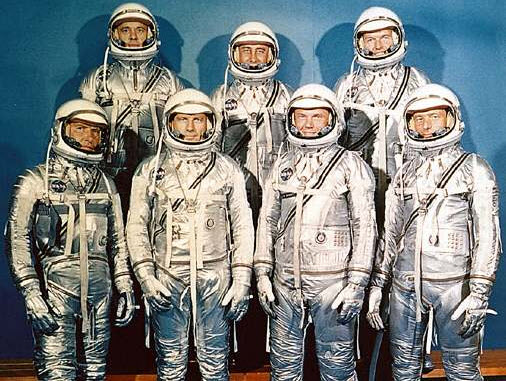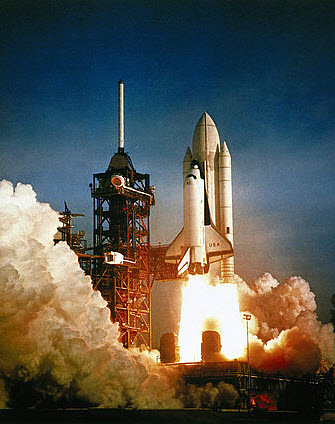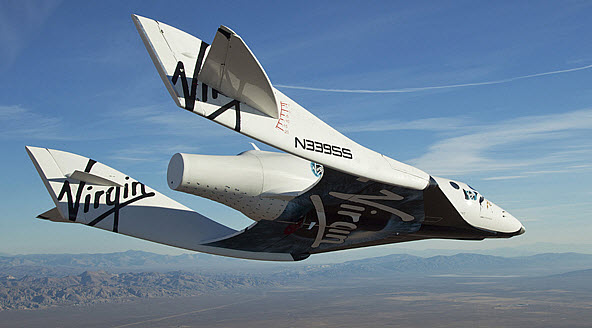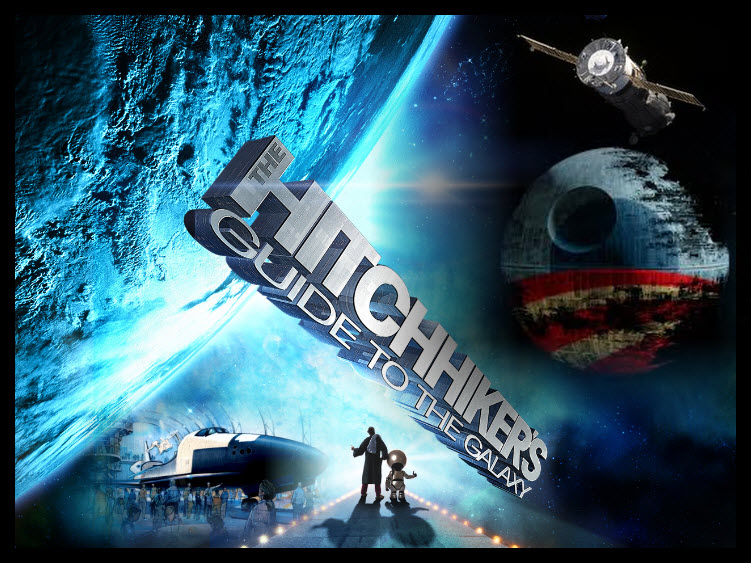I was born in 1960. When I was but 6 months old, Alan Shepard did something no American had ever done. He flew in space. I don’t remember that but again, I was but 6 months old at the time.
By the time I was old enough to comprehend such things as astronauts, we had finished with the Mercury program at NASA and moved on to the Gemini program. Some of the first important people I can remember hearing of, were the original 7 astronauts. Shepard, Glen, Grissom, Cooper, Carpenter, Schirra and Slayton. I knew their names before I knew what NASA was.
They rode rockets.
They rode rockets with USA on the side of them.
Mission Control talked to them. They did NOT lift off…they BLASTED off. They did not touch down…they SPLASHED down.
They rode rockets with USA on the side of them.
I remember when 3 astronauts died on the launch pad in a fire. Ed White, the first American to walk in space…Gus Grissom who nearly drowned when he splashed down one time and Roger Chaffee, a Navy pilot who became an astronaut. When they died…we did not quit. NASA made the Apollo spacecraft better so it would not happen again and we continued.
 The Apollo program took astronauts all the way to the moon. In 1969, Neil Armstrong and Buzz Aldren walked on the moon for the first time. They became WORLD heroes. WE won the race to the moon.
The Apollo program took astronauts all the way to the moon. In 1969, Neil Armstrong and Buzz Aldren walked on the moon for the first time. They became WORLD heroes. WE won the race to the moon.
They rode rockets with USA on the side of them.
Apollo also provided Skylab where astronauts in 1973 and 1974 lived, worked and conducted experiments. Skylab was our first space station and it had USA on the side of it.
After Skylab and the end of the Apollo program…we did not quit. Yes it took several years but we knew exactly where we were heading. We were building the Space Shuttle and that ship would be used to build a NEW space station…the International Space Station.
In April of 1981, the first Space Shuttle was launched. It was exciting. The first Shuttle, Columbia, was a test flight, meant to see if the rocket with wings could actually be launched, orbit, reenter the atmosphere, glide and land to be reused again; only carried 2 astronauts, Bob Crippen, a 1st time astronaut and John Young who started in the Gemini program and walked on the moon in the Apollo program.
They rode a rocket with USA on the side of it.
For 30 years, the Space Shuttles LIFTED off and TOUCHED down. They carried satellites into orbit, space telescopes, experiments and yes, they built the International Space Station.
Do you remember Francis Scobee, Michael Smith, Judith Reznik, Ron McNair, Ellison Onizuka, Greg Jarvis, Christa McAuliffe, Rick Husband, Michael Anderson, William McCool, Kalpana Chawla, Ilan Ramon, David Brown and Laurel Clarke?
They died in rockets with USA on the side of them.
After the Shuttle disasters…we did not quit. We made the Shuttles better and implemented new ways to detect damage and the program continued to fly astronauts into space.
The history of American manned space flight does not begin nor does it end with those who flew in space but perhaps more importantly, with those who were based on Earth. Tens of thousands of men and women were involved in every aspect. Without them, Americans would never have left their Earthly bonds.
They engineered, trained, prepared, repaired, designed, communicated, and dreamed.
They built rockets with USA on the side of them.
The Space Shuttle program ended in the predawn hours of July 21st 2011…42 years and 1 day after an American first walked on the moon and 50 years 2 months, and 16 days after an American first flew in space. Other American space programs have ended but this time, it’s different. When Mercury ended, we had Gemini with which to move forward. When Gemini ended, we had Apollo with which to move forward. When Apollo ended…the Space Shuttle.
This time we have no real plan. There is Orion but that is more of an unfunded waste of an okay idea than a move forward. For the  foreseeable future, Americans will continue to fly in space but we will do it as mere passengers, not as pilots or commanders. The tech support, all those tens of thousands of dreamers, engineers, designers, communicators, pre and repairers and those builders are gone as is their collective knowledge.
foreseeable future, Americans will continue to fly in space but we will do it as mere passengers, not as pilots or commanders. The tech support, all those tens of thousands of dreamers, engineers, designers, communicators, pre and repairers and those builders are gone as is their collective knowledge.
Should Americans restart a new program, we will start from near scratch.
There are private companies building and dreaming but so far, their contribution will be to deliver supplies to the space station…not the people who will use those supplies.
Those rockets will likely have advertising on the side of them.
John F. Kennedy challenged America in 1961 when he said, “First, I believe that this nation should commit itself to achieving the goal, before this decade is out, of landing a man on the moon and returning him safely to the earth. No single space project in this period will be more impressive to mankind, or more important for the long-range exploration of space; and none will be so difficult or expensive to accomplish. We propose to accelerate the development of the appropriate lunar space craft. We propose to develop alternate liquid and solid fuel boosters, much larger than any now being developed, until certain which is superior. We propose additional funds for other engine development and for unmanned explorations–explorations which are particularly important for one purpose which this nation will never overlook: the survival of the man who first makes this daring flight. But in a very real sense, it will not be one man going to the moon–if we make this judgment affirmatively, it will be an entire nation. For all of us must work to put him there.”
accelerate the development of the appropriate lunar space craft. We propose to develop alternate liquid and solid fuel boosters, much larger than any now being developed, until certain which is superior. We propose additional funds for other engine development and for unmanned explorations–explorations which are particularly important for one purpose which this nation will never overlook: the survival of the man who first makes this daring flight. But in a very real sense, it will not be one man going to the moon–if we make this judgment affirmatively, it will be an entire nation. For all of us must work to put him there.”
He followed that statement with, “Let it be clear–and this is a judgment which the Members of the Congress must finally make–let it be clear that I am asking the Congress and the country to accept a firm commitment to a new course of action, a course which will last for many years and carry very heavy costs: 531 million dollars in fiscal ’62–an estimated seven to nine billion dollars additional over the next five years. If we are to go only half way, or reduce our sights in the face of difficulty, in my judgment it would be better not to go at all.”
And in a later speech Kennedy stated, “We choose to go to the moon. We choose to go to the moon… (interrupted by applause) we choose to go to the moon in this decade and do the other things, not because they are easy, but because they are hard, because that goal will serve to organize and measure the best of our energies and skills, because that challenge is one that we are willing to accept, one we are unwilling to postpone, and one which we intend to win, and the others, too.”
The American…the AMERICAN manned space program has been a source of inspiration, excitement, pride, sorrow and accomplishment not just for Americans but for the world. For now, it is but a museum display. Most likely it will rise again but differently, privately funded as a commercial enterprise and surely there will be new milestones and great things in the future but it will probably not carry the sense of national awe that it has in the past.
Now, as we ride along, hitching, begging our way, paying upwards of 60 million dollars per in taxi fares…I doubt Kennedy would recognize or favor our decision to simply walk away from that which he set into motion.
If other nations still wish to emulate the American manned space program…there are but 2 things they need do.
1) Become the world leader in manned space flight.
2) Quit.
We will ride in rockets with Russia on the side of them.




